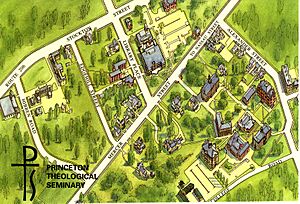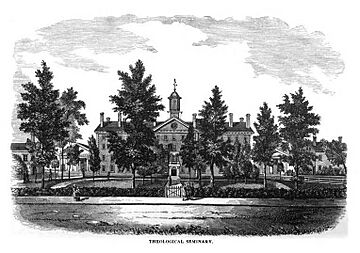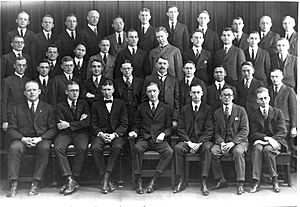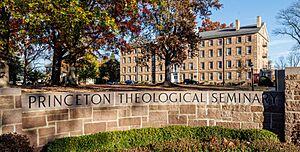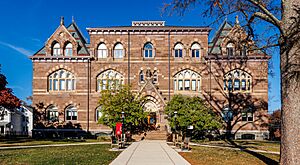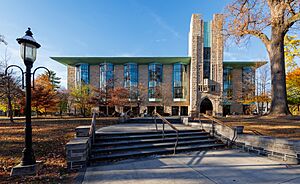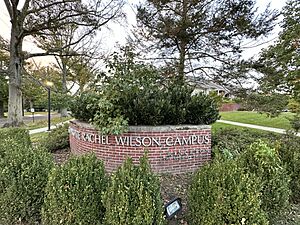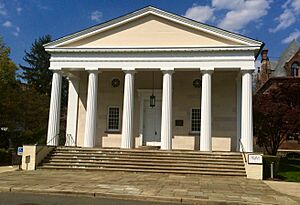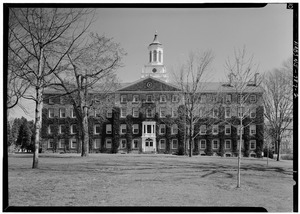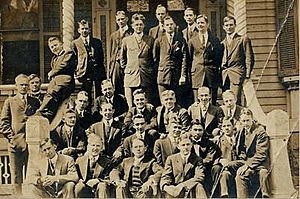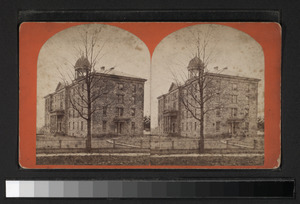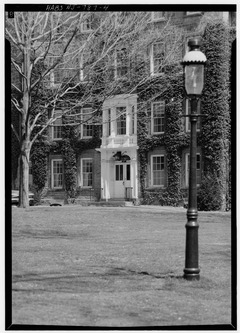Princeton Theological Seminary facts for kids
 |
|
| Type | Seminary |
|---|---|
| Established | 1812 |
| Accreditation |
|
| Affiliation | Presbyterian Church (USA) |
| Endowment | $1.459 billion (2022) |
| President | Jonathan L. Walton |
|
Academic staff
|
40 (full-time) and 21 (part-time) |
| Students | 333 |
| 58 | |
| Location |
64 Mercer Street
,
,
Princeton U.S.
|
| Campus | Suburban, 23 acres (9.3 ha) |
| Colors | Yale Blue and Scarlet |
 |
|
Princeton Theological Seminary, often called PTSem, is a special school in Princeton, New Jersey. It is a private school that teaches people about theology, which is the study of religious faith and practice.
It started way back in 1812, making it one of the oldest schools of its kind in the United States. It was created with help from people like Archibald Alexander, the Presbyterian Church (USA), and what is now Princeton University. PTSem is also the biggest of ten similar schools connected to the Presbyterian Church.
PTSem has the biggest library for theology in the United States. It is the second largest in the world, only after the Vatican in Rome. The school also has many special collections, like the Karl Barth Research Collection. In 2022, the seminary had a large fund of $1.459 billion. This made it the third wealthiest higher education school in New Jersey. Only Princeton University and Rutgers University had more money.
Many important biblical scholars, theologians, and clergy have studied or taught at Princeton Seminary. In the 1980s, about 900 students attended. By Fall 2023, there were about 276 full-time students. While some students prepare to be ministers in the Presbyterian Church, most are training for other church roles. Others pursue careers in teaching or other fields.
The Seminary works with Princeton University and other schools. These include the Westminster Choir College, New Brunswick Theological Seminary, and the Rutgers School of Social Work.
Contents
History of Princeton Theological Seminary
The idea to start a theology school in Princeton was to offer more advanced religious studies. The goal was to create a special school for theology after students finished their regular college studies. Leaders at the College of New Jersey, which became Princeton University, liked this idea. They realized they could not give enough attention to specialized theology training.
So, in 1812, the General Assembly of the Presbyterian Church started the Theological Seminary in Princeton. It was the second graduate theology school in the United States. The seminary is still part of the Presbyterian Church (USA). It is the largest of the ten theology schools linked to this church.
In 1812, the seminary had only three students. Archibald Alexander was its first professor. By 1815, more students joined. Work began on a building called Alexander Hall. It was designed by John McComb Jr. and opened in 1817. The building was simply called "Seminary" until 1893. Since it began, about 14,000 men and women have graduated from Princeton Seminary. They have served the church in many ways, from being pastors to missionaries and educators.
During the 1800s and early 1900s, the seminary was known for defending Calvinistic Presbyterianism. This way of thinking was called Princeton Theology. It greatly influenced Evangelicalism at that time. Important figures in this movement included Charles Hodge and B. B. Warfield.
Changes and New Schools
In the 1920s, new ideas in theology became more popular. This led to a disagreement at the seminary. Some theologians left to start a new school called Westminster Theological Seminary. This happened under the leadership of J. Gresham Machen.
In 1929, Princeton Seminary changed its structure. In response, Machen and three of his colleagues resigned. They then founded Westminster Theological Seminary in Glenside, Pennsylvania. In 1958, Princeton became a seminary of the United Presbyterian Church in the U.S.A.. This was after two Presbyterian churches merged. In 1983, it became a seminary of the Presbyterian Church (U.S.A.) after another merger.
Looking at Ties to Slavery
In 2019, the seminary announced a plan to spend $27 million. This money would go to scholarships and other programs. These efforts aim to address the school's past connections to slavery.
Academics at Princeton Seminary
Princeton Theological Seminary is officially recognized by important groups. These include the Association of Theological Schools (ATS) since 1938. It is also recognized by the Middle States Commission on Higher Education since 1968.
Degree Programs Offered
Students at Princeton Seminary can earn several types of degrees:
- Master of Divinity (M.Div.)
- Masters of Arts (MA)
- Master of Arts in Theological Studies (MATS)
- Master of Theology (Th.M.)
- Doctor of Philosophy (Ph.D.)
The seminary also offers special dual degree programs. These include a combined M.Div./MA in Christian Education. Another is an M.Div./MSW in partnership with the Rutgers School of Social Work.
Seminary Libraries
The Wright Library is a very important place for scholars from all over the world. The current library building was finished in 2013. It was renamed on October 13, 2021, after Theodore S. Wright. He was the first African American to graduate from Princeton Theological Seminary.
The library holds over 1.2 million books, pamphlets, and microfilms. It also receives about 2,100 journals and other publications. The main libraries are:
- Princeton Theological Seminary Library (The Wright Library): This library opened in 2013. It holds most of the seminary's collection. It also has special collections, like the Karl Barth Studies Center.
- Speer Library: This library opened in 1957. It closed in late 2010 and was replaced by the new Wright Library.
- Henry Luce III Library: This library opened in 1994. It merged with Wright Library in 2013.
Seminary Rankings
Princeton Seminary is a special graduate school. So, it does not appear in most global university rankings. However, it does get ranked sometimes as a graduate program. In 2020, U.S. News & World Report ranked it #53 nationwide for history. It also received an A+ rating from the company Niche in 2020. In 2012, the journal First Things ranked Princeton Seminary fifth among American graduate theology programs.
Student Life at Princeton Seminary
In 2021, 114 degrees were given out. About 52.6% went to women, and 47.4% went to men.
Seminary Chapel
Princeton Seminary's chapel was built in 1834. It was named to honor Samuel Miller, the seminary's second professor. The chapel was designed in the Greek Revival style. It was moved in 1933 to the center of the campus. The chapel was fully renovated in 2000.
On January 18, 2022, students protested the chapel's name. They asked the trustees to rename it because of Samuel Miller's past ties to slavery. On January 25, 2022, the Board of Trustees voted to rename Miller Chapel. This decision was part of their effort to address the seminary's history with slavery.
In 2011, Princeton Theological Seminary started a program called "Navigating the Waters." This program helps faculty, staff, and students learn about different cultures. It aims to promote understanding and diversity at the school.
Research and Centers
Center for Barth Studies
The Center for Barth Studies started at Princeton Seminary in 1997. It is managed by seminary faculty. The Center holds conferences and supports research. It helps people better understand the theology of Karl Barth. He was a German Swiss professor and pastor. Many consider him the most important theologian of the 20th century.
The Karl Barth Research Collection is part of the seminary's special library collections. It supports the Center's work. This collection gathers writings by and about Karl Barth.
Abraham Kuyper Center for Public Theology
This center focuses on the theology and history of Dutch Reformed Protestantism. It has a large collection of writings by and about Abraham Kuyper. The center also works with a university in Amsterdam. Together, they maintain an online database about Abraham Kuyper.
The center also gives out an annual award called the Abraham Kuyper Prize. The person who receives the award gives a speech.
Center of Theological Inquiry
In 1978, Princeton Theological Seminary created the Center of Theological Inquiry (CTI). This is an independent group for advanced theological research. It studies how different religious ideas connect with each other. It also looks at how religion relates to science and modern society. Today, the CTI has its own board, funding, and staff.
Journals Published
- Theology Today: This is a quarterly journal about Christian theology. It started in 1944.
- Koinonia Journal: This journal is published once a year by doctoral students. It encourages discussions about theology and religion.
- Princeton Theological Review: This is a student-run journal published online every year. It serves students and the wider theology community.
Seminary Lectureships
Princeton Seminary hosts many special lectures throughout the year. These lectures bring important scholars and speakers to the seminary. Some of these include:
- The Abraham Kuyper Lecture
- The Alexander Thompson Lecture
- The Dr. Martin Luther King Jr. Lecture
- The Levi P. Stone Lectures, which started in 1871.
- The Annie Kinkead Warfield Lectures, which honor Annie Kinkead Warfield.
- The Women in Church and Ministry Lecture.
Frederick Buechner Prize
The seminary created the Buechner Prize for Writing to honor the acclaimed writer and theologian Frederick Buechner. Princeton Seminary has also hosted writing workshops with Buechner.
Important People at Princeton Seminary
Leaders of Princeton Theological Seminary
Before 1902, the seminary was led by a "principal." After that, the leader was called a "president."
- Principals
- Archibald Alexander (1812–1850)
- Charles Hodge (1851–1878)
- Archibald Alexander Hodge (1878–1886)
- B. B. Warfield (1887–1902)
- Presidents
- Francis Landey Patton (1902–1913)
- J. Ross Stevenson (1914–1936)
- John A. Mackay (1936–1959)
- James I. McCord (1959–1983)
- Thomas W. Gillespie (1983–2004)
- Iain R. Torrance (2004–2012)
- M. Craig Barnes (2013–2023)
- Jonathan L. Walton (since 2023) – He is the first Black president and the first non-Presbyterian president.
Notable Faculty (Past and Present)
- Diogenes Allen
- Dale C. Allison
- Bernhard Anderson
- William Park Armstrong
- Emil Brunner
- Donald Eric Capps
- James H. Charlesworth
- Ellen Charry
- F. W. Dobbs-Allsopp
- Jane Dempsey Douglass
- Freda Gardner
- L. Gordon Graham
- George Hendry
- John Hick
- Seward Hiltner
- Archibald Alexander Hodge
- Charles Hodge
- Elmer G. Homrighausen
- George Hunsinger
- James Franklin Kay
- J. Gresham Machen
- Bruce L. McCormack
- Bruce Metzger
- Patrick D. Miller
- Samuel Miller
- Otto Piper
- Luis N. Rivera-Pagán
- J. J. M. Roberts
- Katharine Doob Sakenfeld
- C. L. Seow
- Richard Shaull
- Mark S. Smith
- Max L. Stackhouse
- Loren Stuckenbruck
- Mark Lewis Taylor
- Wentzel van Huyssteen
- Geerhardus Vos
- B. B. Warfield
- Robert Dick Wilson
- Robert Jenson
Notable Alumni
- James Waddel Alexander, 1823
- William Patterson Alexander – missionary to Hawaii
- Oswald T. Allis, 1905
- Rubem Alves, 1968 – theologian
- Gleason Archer, 1945 – evangelical theologian
- Albert Barnes, 1823
- Howard Baskerville
- Louis Berkhof, 1904
- Loraine Boettner, 1929
- Greg Boyd, 1987
- James Montgomery Boice, 1963
- William Whiting Borden
- Dave Brat, 1990 – professor, Randolph-Macon College
- Robert Jefferson Breckinridge, 1832
- G. Thompson Brown, 1950 – missionary; founder, Honam Theological Academy
- Hugh M. Browne, 1878 – educator; principal, Institute for Colored Youth
- Ernest T. Campbell – pastor, Riverside Church
- Eugene Cho, 1997 – president, Bread for the World
- Hunter Corbett – missionary to Yantai, China
- Jack Cottrell
- John Finley Crowe, 1815 – founder, Hanover College
- Michael Simpson Culbertson, 1844 – missionary to China
- Kathy Dawson – Professor of Christian Education
- William Dembski, 1995 – philosopher; intelligent-design advocate
- Hilliard Dogbe – presiding bishop, African Methodist Episcopal Zion Church
- John H. Eastwood, 1941 – U.S. Army Air Corps chaplain in World War II
- Sherwood Eddy, 1896 – missionary to India; leader, YMCA
- Bart D. Ehrman, 1985 – professor; writer
- Anna Carter Florence, 2000
- George Forell
- David Otis Fuller
- Robert A. J. Gagnon, 1993
- George Washington Gale, 1819 – founder, Knox College
- Jim Garlow – pastor, Skyline Church
- James Leo Garrett Jr., 1949 – theologian
- William H. Gray, 1970
- Richard C. Halverson, 1942 – 60th Chaplain of the U.S. Senate
- William Henry Green, 1846
- Francis James Grimké, 1878 – African-American Presbyterian pastor; co-founder, NAACP
- Phineas Gurley – Abraham Lincoln's pastor
- Kyung-Chik Han, 1929 – founder, Young Nak Presbyterian Church; winner, Templeton Prize
- George C. Heckman – president, Hanover College 1870–79
- Charles Hodge, 1819
- Elmer George Homrighausen, 1924
- William Imbrie – missionary to Japan
- Sheldon Jackson, 1858 – Presbyterian missionary in Alaska
- Thornwell Jacobs, 1899 – founder, Oglethorpe University
- Richard A. Jensen, 1962 – theologian; writer
- William Hallock Johnson, 1898 – theologian; president, Lincoln University
- E. Elizabeth Johnson – Professor of New Testament
- Toyohiko Kagawa, 1916
- Margaret Grun Kibben, 1986, 2002 – first female Chaplain of the U.S. House of Representatives
- Guy Kratzer, 1968 – Pennsylvania State Senator
- Kimberly Bracken Long, 1990 – Presbyterian pastor; writer
- Elijah Parish Lovejoy, 1834 – first American martyr for freedom of the press
- Clarence Macartney, 1905
- John Gresham Machen, 1905 – founder, Westminster Theological Seminary
- George Leslie Mackay – Canadian missionary to Taiwan
- John Maclean Jr., 1818 – president, Princeton University
- Allan MacRae, 1927 – founder, Faith Theological Seminary
- Basil Manly Jr., 1847
- Carl McIntire – fundamentalist; transferred to Westminster Theological Seminary in 1929
- David McKinney
- Bruce Metzger, 1938
- Samuel H. Moffett, 1942 – missionary; educator
- John Monteith, 1816 – first president, University of Michigan
- Frederick Augustus Muhlenberg, 1839 – educator
- John Murray – theologian
- Byron C. Nelson, 1936 – apologist for creationism
- John Williamson Nevin, 1826
- John Livingstone Nevius – missionary to China
- Harold Ockenga – figure in 1950s Neo-Evangelicalism; transferred to Westminster Theological Seminary in 1929
- Kathleen M. O'Connor
- Jeanne Audrey Powers – leader, United Methodist Church; advocate for women and LGBTQ+ people
- Francis Landey Patton, 1865
- Abune Paulos – patriarch, Ethiopian Orthodox Tewahedo Church
- Bradley Phillips, 1849 – member, Wisconsin State Assembly
- William Swan Plumer, 1826 – Presbyterian clergyman; writer
- James Reeb, 1953 – civil-rights martyr
- George S. Rentz – U.S. Navy chaplain during World War I and World War II
- Joseph L. Roberts Jr. – American pastor
- Jana Riess, 1994
- Jay Richards
- Stanley P. Saunders, 1990
- Samuel Simon Schmucker, 1820
- Louis P. Sheldon, 1960
- Charles Woodruff Shields, 1847
- Robert B. Sloan, 1973 – educator
- DeForest Soaries
- William Buell Sprague, 1819
- Ned B. Stonehouse, 1927
- Loren Stuckenbruck
- Lorna Taylor
- Charles Templeton – Canadian journalist
- Timothy Tennent, 1991
- Mark L. Tidd – U.S. Navy Admiral, 25th Chief of Chaplains
- Conrad Tillard (born 1964; Master of Theology) – Baptist minister; writer; civil-rights activist
- Henry van Dyke, 1874
- Cornelius Van Til, 1924 – theologian; later followed John Gresham Machen to Westminster Theological Seminary in 1929
- Geerhardus Vos, 1885
- Benjamin Breckinridge Warfield, 1876
- Neil Clark Warren
- Victor Paul Wierwille, Th.M – founder, The Way International
- Ralph D. Winter, B.Div – founder, U.S. Center for World Mission
- Theodore S. Wright, 1828 – first African-American graduate
- John C. Young, 1828 – pastor; fourth president, Centre College
See also
 In Spanish: Seminario Teológico de Princeton para niños
In Spanish: Seminario Teológico de Princeton para niños
 | Charles R. Drew |
 | Benjamin Banneker |
 | Jane C. Wright |
 | Roger Arliner Young |


